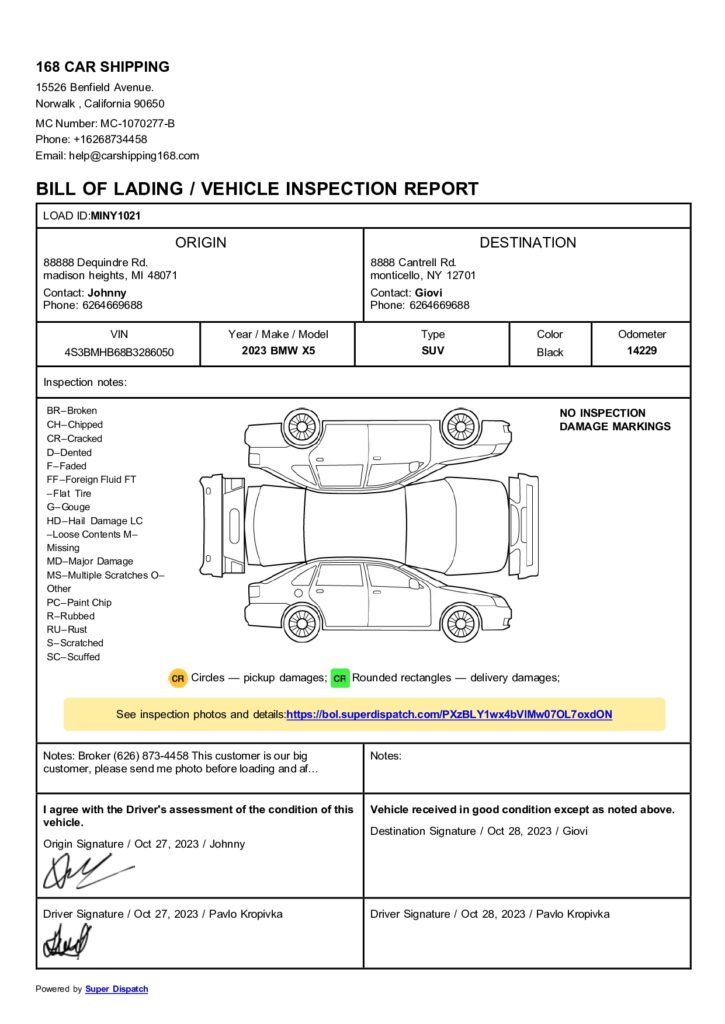The paperwork involved in shipping a vehicle can be confusing, but it’s actually quite straightforward. While there may be a lot of documents involved in shipping your car, only two are absolutely essential: your bill of lading and your shipping contract.
There’s no document more important in car shipping than the bill of lading, sometimes referred to as a BOL. Serving as proof of delivery, the bill of lading documents the condition of your vehicle when it’s picked up and delivered. If you don’t note any damage on the bill of lading, your insurance company won’t cover the cost of repairs, as they have no proof of the claim.
For many first-time car shipping customers, the term “bill of lading” might be a bit foreign. Often abbreviated as BOL, this term is widely used in the car shipping and other transportation industries, but its significance may not be clear to most people. The bill of lading is one of the most critical documents in the car shipping process, and we’ll delve deeper into its definition and why it’s so important.”
Here’s a breakdown of some key terms and their meanings:
- Bill of lading (BOL): A legal document that serves as a receipt of goods and a contract of carriage. In the context of car shipping, it details the shipment of a vehicle.
- Proof of delivery: Documentation that confirms that a shipment has been received at its destination.
- Claim: A formal request for compensation, typically made to an insurance company.
This translation aims to:
- Maintain the original meaning: The translated text conveys the same information as the Chinese version.
- Use clear and concise language: The English is easy to understand, even for those who are not native English speakers.
- Provide context: The translation includes additional explanations to clarify the meaning of specific terms like “bill of lading.”
What is a Bill of Lading (BOL)?
A Bill of Lading (BOL) is a commonly used shipping document in international trade that serves as proof of ownership of goods. In vehicle transportation, a BOL plays several crucial roles:
- Evidence of the contract of carriage: The BOL is part of the transportation contract, detailing the agreements between the shipper and the carrier.
- Proof of ownership: The BOL symbolizes ownership of the goods and is required to claim the shipment.
- Basis for claims: If the goods are damaged or lost during transportation, the BOL serves as the primary document for filing a claim.
A Bill of Lading (BOL) is a legal document that provides detailed information about the specific vehicle being transported, the origin and destination of the shipment, and the parties involved in the transportation. It also includes all relevant information about the vehicle before it is handed over to the transportation company, as well as a second inspection of the vehicle before it is returned to the owner. Essentially, a bill of lading can be considered a legal contract between the transportation company and the vehicle owner. Regulations require automotive transportation companies to prepare a bill of lading prior to initiating the transportation. It serves not only as a record but is also required by insurance companies when a claim needs to be filed for a vehicle in transit. The bill of lading should be prepared by the automotive transportation company, and a copy should be given to both the vehicle owner and the driver prior to transportation.
In summary, when arranging for long-distance vehicle transportation, it is important to have the necessary documents ready and to carefully review the documents provided by the transportation company, especially the bill of lading. The BOL is a crucial document throughout the transportation process and should be kept safely.
The Importance of a Bill of Lading
A bill of lading is an extremely important legal document that not only protects the rights of the vehicle owner but also safeguards the transportation company from damage, fraudulent, or false insurance claims. It is a legally mandated document that also allows transportation companies to safely move personal vehicles from one location to another. As a valid proof of transportation, the bill of lading must be signed by all parties involved during the delivery and pick-up process.
By understanding the contents and purpose of a bill of lading, customers can have greater confidence that their vehicles are adequately protected throughout the transportation process. This document is not only a legal requirement for the delivery and pick-up process but also a crucial tool for ensuring that a legal agreement between the vehicle owner and the transportation company is fulfilled.
